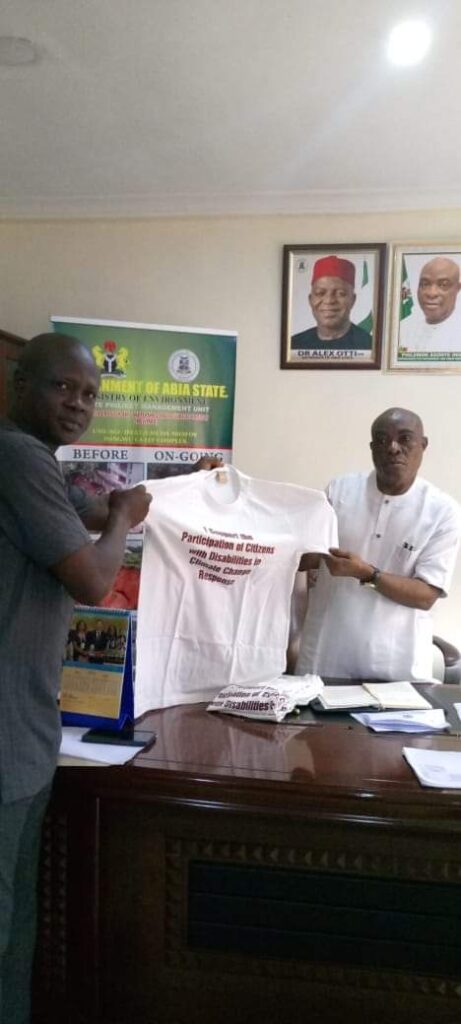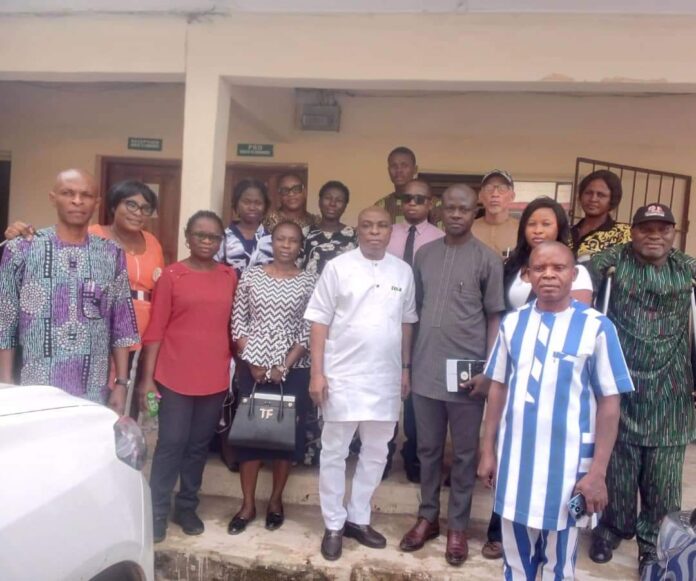Umuahia, July 11, 2024 — The Centre for Citizens with Disabilities (CCD) has taken a significant step towards ensuring that climate change policies in Abia State are inclusive of Persons with Disabilities (PWDs). In an advocacy visit to the Commissioner of the Ministry of Environment, CCD presented a comprehensive research report on “Disability-Inclusive Climate Change Adaptation and Mitigation in Abia State.”
The CCD delegation, led by Senior Programme Officer Mr. Damian Ivom, highlighted the ongoing interventions aimed at enhancing the inclusion of PWDs in climate change mitigation and adaptation efforts. The visit underscored the importance of formally engaging with the Ministry to chart a collaborative path forward.

Enhancing Inclusion in Climate Policies
During the meeting, Mr. Ivom debriefed the Ministry on CCD’s current initiatives and emphasized the necessity of integrating PWDs into climate change strategies. “Our goal is to ensure that no one is left behind, especially the most vulnerable populations who are often disproportionately affected by climate change,” said Mr. Ivom. He further explained that the advocacy visit was crucial for establishing a formal partnership with the Ministry and developing a roadmap for inclusive climate action.
In response, the Commissioner expressed the Ministry’s willingness to collaborate with CCD. He acknowledged the critical need for disability-inclusive policies and shared insights into the Ministry’s recent developments and ongoing efforts in climate change mitigation and adaptation. The Commissioner reaffirmed the State Government’s commitment to inclusive development, encapsulated in the principle of “Leaving No One Behind.”
State Government’s Commitment to Inclusive Development
The Commissioner outlined several initiatives aimed at addressing climate change in Abia State, including community-based adaptation programs and the promotion of sustainable agricultural practices. “We recognize that climate change impacts everyone, but its effects can be more severe on vulnerable groups, including persons with disabilities. Therefore, our policies must reflect inclusivity and equity,” the Commissioner stated.
He further noted the State Government’s efforts to enhance public awareness about climate change and its impact on different communities. By incorporating the needs and perspectives of PWDs, the Ministry aims to develop more robust and effective climate action plans that benefit all residents of Abia State.
Vote of Thanks and Future Prospects
The advocacy visit concluded with a vote of thanks from Mrs. Nkiru Okoro, who appreciated the Commissioner for his consistent support and the CCD for their pioneering initiative. “We are grateful for your openness and commitment to this cause. Together, we can make significant strides towards a more inclusive and resilient society,” Mrs. Okoro remarked.
The project, supported by the Disability Rights Fund, marks a pivotal moment in the journey towards disability-inclusive climate policies in Abia State. As CCD continues to champion the rights and inclusion of PWDs, this partnership with the Ministry of Environment is poised to create meaningful and lasting impact.
Broader Implications for Climate Action
This advocacy visit is part of a broader movement to integrate disability rights into climate change discourse. Across Nigeria, and indeed globally, there is a growing recognition that inclusive policies are essential for sustainable development. By ensuring that the voices of PWDs are heard and their needs are addressed, initiatives like CCD’s are setting a precedent for more equitable and effective climate action.
The collaboration between CCD and the Ministry of Environment serves as a model for other states to emulate. It underscores the importance of multi-stakeholder engagement and the need for comprehensive strategies that consider the diverse impacts of climate change on different segments of the population.
As the world grapples with the escalating impacts of climate change, the inclusion of marginalized groups, particularly PWDs, becomes increasingly crucial. Efforts such as these not only enhance resilience and adaptation but also foster a more just and inclusive society.
Conclusion
The advocacy visit by CCD to the Ministry of Environment is a testament to the power of collaboration and the importance of inclusive policies in addressing global challenges like climate change. With continued support from stakeholders and the commitment of government agencies, there is hope for a future where every individual, regardless of their abilities, can thrive in a sustainable and resilient environment.


